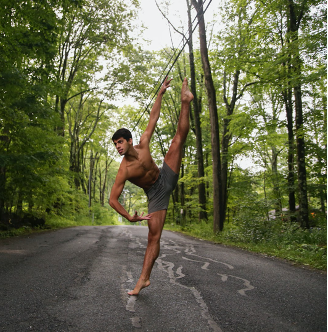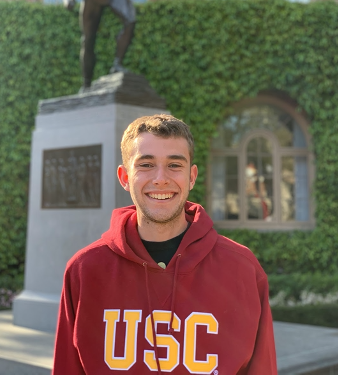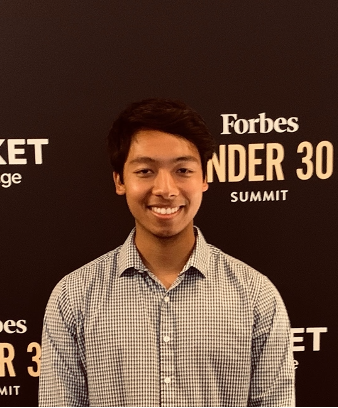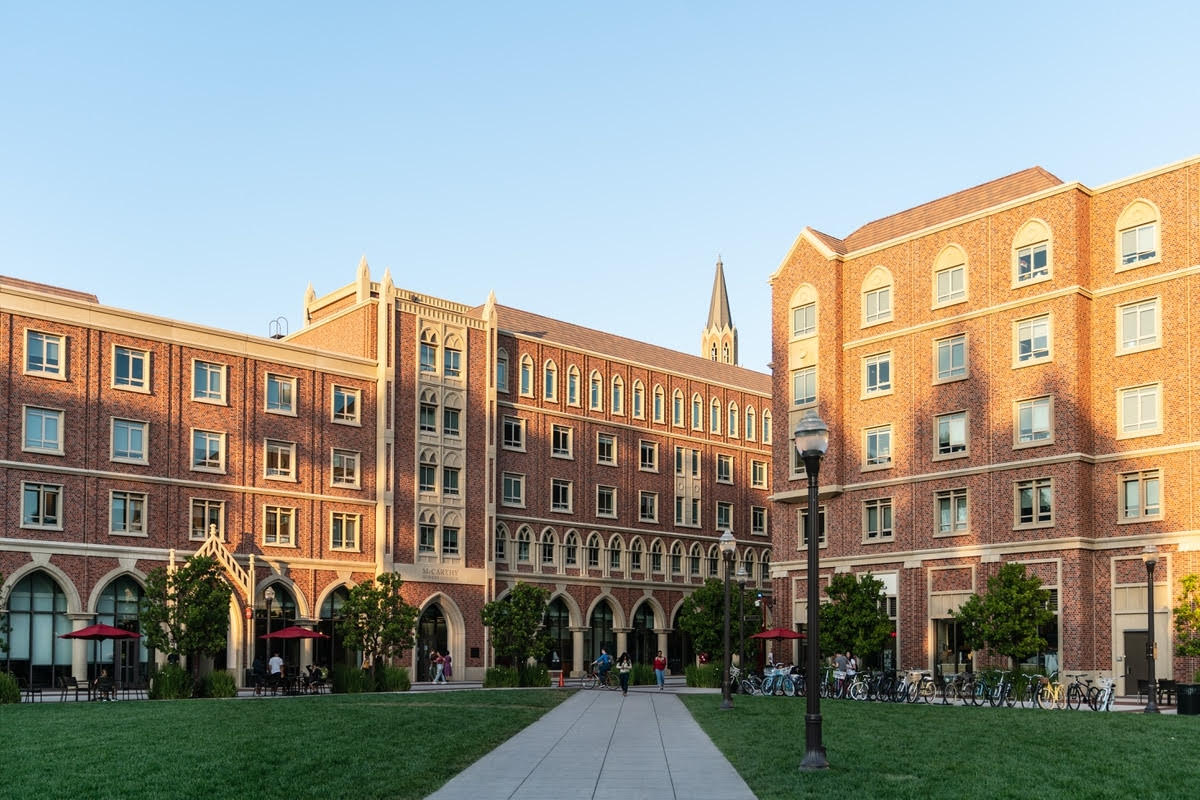Mariano Gonzalez

Senior, USC Glorya Kaufman School of Dance
Major: Dance
Hometown: San Jose, Costa Rica
Reasons for choosing USC: Great professors and the guest artists the university invites for its students; fell in love with the school immediately after auditioning
For the last three years, senior Mariano Gonzalez found his home within the Glorya Kaufman International Dance Center and its community as he spent a upward of five hours in the studio daily, perfecting his technique through morning ballet, hip-hop and or contemporary class followed by a three-hour block of choreography during the weekdays. Prior to the pandemic, weekends for Kaufman dancers were even more intense. Gonzalez danced about 12 hours per day while integrating his Architecture minor and GE courses between all of the rehearsing and training. All of the dedication Gonzalez has put toward his degree was in preparation to pursue his post-graduation career goal in Concert Dance as well as being able to effectively utilize all the connections Kaufman has with companies worldwide, which has not changed during the pandemic.
Although Gonzalez’s current career goals and class content is fairly similar to his pre-pandemic life, his current “studio” is extremely different. Instead of the widespread dance floor space he is familiar with inside the Kaufman facilities, Gonzalez finds himself improvising with his limited apartment space and furniture.
“I have the T.V. right here, which I plug the computer to so that I can see the teacher larger, and I take ballet right here while I use that [arm of a wooden chair] as my bar that I hang on to.”
While remote college life has indeed given Gonzalez some benefits, such as more time for eating and sleeping by cutting out transportation and warm-up time, he still has plenty of other worries. Since auditions for the Concert Dance industry began in January of the upcoming year, Gonzalez opened up about that being one of, if not the biggest, stress points right now.
“I have to be really in-shape and super trained where my technique is spotless, so not having the ability to be in a studio and move as I am used to since we haven’t done any big jumps, which is a big part of ballet, because of the apartment floor and how dangerous it can be has been stressful,” in addition to the worry of possibly having Zoom auditions or having auditions postponed overall.
Since finding balance between work and social life was something Gonzalez prioritized at school, that has changed since going online as he is currently strictly focused on dance, which he describes as a “bittersweet relationship.” Self-motivation has been more imperative than ever before., “Nobody is here telling me to strengthen my core, like how before we would go to Kaufman and train everyday and have our teachers be motivational in-person, but I know that I still have to do it if I want a job.”
Maya Golob

Junior, USC Keck School of Medicine
Major: Health Promotion and Disease Prevention
Hometown: Los Angeles, CA
Reasons for choosing USC: Amazing location, professors, and football; mother went to USC; dance and/or ice skating opportunities; Trojan Family
Junior Maya Golob has been first-handly involved with the roaring football games, the spirit of our Trojan Family and all the exciting game days. As a second-year USC Song Girl, Golob understands what a busy day feels like as she spent a daily three hours rehearsing in the studio and an entire weekend performing during half-time, all on top of demanding course work.
Prior to the pandemic, Golob had a jam-packed schedule: Song Girl commitments seven days a week; sorority events at night, pre-medical required laboratory classes during the day and club meetings in between. While some see this down to the minute schedule as overwhelming, Golob enjoys the structure.
“I think that’s how you make the most out of a big school. Opportunities don’t approach you. You have to approach them, so I want to be as involved as I could be at USC.”
Now, Golob currently lives at home at a very much different pace than she’s used to at school. Disappointed by online education from last semester, she decided to only take one course, physics with laboratory, for her first-semester junior year. In addition to a diminished course load, Golob also has fewer Song Girl commitments, club involvements and Greek Life socials. Although these changes have their perks — like getting to try new online workouts for Song and having more free time —Golob misses the college experience, the library and the socials. The demands of in-person class, she says, held her accountable for getting assignments early and studying for exams.
Through it all, Golob is keeping up with her academic goals. However, she also shares her main stress points of studying for the MCAT, finding hospital work, apartment hunting, and prepping for Song Girl auditions and performances, which have all been more challenging given the pandemic.
“I feel like students always put on a mask of ‘Everything is fine, we just gotta get through this lab and exam,’” Golob said. “But I feel like there is not much care taken into if they are really fine, since not all the USC resources may help everyone with stress or health management. With everyone facing the same extended uncertainty, Golob finds it crucial to pause, and take a moment to check in — not only with herself, but also with her peers. “It’s a lot when you don’t have a support system.”
Ryan Alimento

Freshman, USC Viterbi School of Engineering
Major: Chemical Engineering
Hometown: Los Angeles, CA
Reasons for choosing USC: Trustee Full-Scholarship Recipient; the people
Less than six months ago, USC freshman Ryan Alimento was looking forward to celebrating his final high-school send off. As senior class president, he was helping to plan dances, and creating memories with his hometown friends. Instead, he spent the last months of his year holed up at home with his parents followed by an online and drive-through graduation.
But Alimento hoped that the start of one milestone -- starting college -- would redeem the loss of his final semester in high school.
Instead, he is spending them both in the same place: his childhood bedroom. He’s not in a dorm on campus, meeting new people, navigating life with a roommate. Today, he’s listening to his professors lecture over Zoom to a screen full of faces he has never properly met.
Nothing about the setup is ideal, he said. But he’s coping, especially after directly coming from his shortened second-semester senior year.
“I'm the kind of person that doesn't like dwelling on things that have happened for a long time. I was kind of devastated about senior year, but I tend to look to the future and focus on what I can do now and move forward.”
Despite the lack of a traditional experience Alimento manages to rewatch lectures, attend webinars, apply to extracurricular laboratory work and keep up with all his classes, in which he was surprised to find that his coursework is less demanding than he expected. Even during remote learning, he finds himself sticking to a 7 a.m. morning routine; although, he says that staring at his screen for the entire day drains his motivation and focus.
“Especially in classes when I have to pay close attention to details on the screen, Zoom fatigue definitely happens after staring at a screen forever. I can listen to what they’re saying; however, staring for long periods of time definitely tires me out.”
In addition, as a STEM-heavy major, Alimento says taking notes has been quite the experience. Since some professors write on a whiteboard, completely following the lesson notes in real time has been harder to keep track of.
“It is easy to comprehend when somebody is drawing on paper or talking in-person, because you can copy in the same format and easily follow along,” he said. “Now, I’ll have to look at the whiteboard my professor has in the back of his screen, have my paper and draw an arrow just to realize another number is already there, which is the result of a simple format difference.”
Alimento’s number one issue is the lack of separation at his house. The merging of all activities into the one space of his bedroom has made it harder for him to dedicate his focus exclusively on learning, because of the association of certain areas to certain mindsets.
“At school, I could associate the library with studying, classrooms for learning and my room for relaxing. Now, I am always in my room so it’s super easy to get distracted and have less motivation to pay attention.”
While many of these barriers are shared among the entire student body, the additional pressure to form college relationships and meet new people in an exclusively online space is a task that few students have faced before.
Alimento, who is outgoing by nature, struggles with the isolation imposed by his inability to socialize solely online and lack of exposure to meeting other freshmen outside of his major. While USC has created multiple additional virtual freshmen social events, Alimento thinks the university has underestimated the participation and effectiveness of it all, especially since nothing can accurately replace natural person-to-person interactions.
“I don’t think the administration fully realizes that you literally don’t know anybody through the remote system. And I think people who were already in college underestimate how many friends they have and how many of those connections are still continuing online whereas starting fresh and having to form completely new relationships exclusively through a screen is super difficult.”
Caden Hollander

Sophomore, USC School of Cinematic Arts
Major: Film and Television Production
Hometown: San Diego, CA
Reasons for choosing USC: Number one film school; great networking and opportunities within the industry; loved the campus when touring
Unlike many college students who used the weekend as a breather, sophomore Caden Hollander worked every Saturday and Sunday around the clock. His schedule was nonstop — crewing, filming, editing and creating stories.
“People call it a weekend major, because everyone shoots on the weekend so you are constantly working then.”
Like most underclassmen, the majority of Hollander’s coursework involved General Education requirements (GEs); however, the major itself is structured differently. Whenever Hollander was not doing his GEs, Hollander would pitch in on an upperclassman’s film, make his own projects or network with his peers and that grades represented completion and was not emphasized.“The first thing that our dean said when we got to school is to not worry so much about grades. The emphasis is on experimenting and developing yourself as a creative.”
Currently, Hollander lives in his Los Angeles apartment with friends; however, his actual major course work is anything but normal.
“There are no sets to work on and pretty much everything’s been put on pause, especially since [the School of Cinematic Arts] SCA made the decision to cancel all in-person production.”
Like a lot of people, Hollander finds the empty blocks in his day to be a burden.
“I am getting less done than before even though there is technically more time,” he said. Hollander continued by saying how much his worries about the pandemic’s impact on his degree have significantly increased while the number of resources he has access to has decreased. Now, he shoots all his individual projects within his “quarantine bubble.”
“You can't really have a crew,” he said. “You’re a one-man band.”
With the lack of resources, Hollander experiences his fair share of stress points. He is still expected to complete his major course by figuring out how to tell dynamic stories within a very enclosed space and how to get “good performances out of my roommates, which has been interesting,” he said.
Although he no longer has to do bureaucratic procedures, such as filling out forms prior to using the school’s equipment, there are plenty of limitations Hollander and his classmates face.
For a “very skill-and talent-based industry,” Hollander describes his current situation as being completely a setback from a multitude of perspectives. Figuring out certain aspects of the equipment, learning how a camera works and editing software over Zoom he said, is “basically impossible.” And he worries about how he will fit into the industry itself. “Not having as much experience is going to hinder us in the future, because, if we come back next year, we will have to create our junior thesis film with less experience and less equipment exposure.”
As a writer, most of Hollander’s inspiration comes from real life experiences, such as meeting people, or even new films; therefore, due to the limitations of the pandemic, he is spending a lot of time catching up on old films.
For a discipline that directly affects all of us (watching movies), we often are not aware of all the behind-the-scenes action, especially during this pandemic. As a result of most work taking place inside his apartment, Hollander shares how his non-film roommates are getting a first-hand education about the major.
“I’m running around making things and seeing the amount of time, people and processes that are involved to create just a five-minute short film.”
Neal Sivadas

Senior, USC Marshall School of Business
Major: Business Cinematic Arts
Hometown: Seattle, WA
Reasons for choosing USC: Unique major opportunity which is interdisciplinary between business and entertainment; huge sports fan
“A dopamine rush,” is how senior Neal Sividas would describe the rush of his busy lifestyle in-school prior to the pandemic. Pre-pandemic he would stack his schedule with back to back classes as he enjoyed longboarding from one place to another around campus. Besides his academic commitments, Sivadas squeezed in some type of daily exercise, such as basketball at the Lyon Center, and dedicated a significant amount of time to organizations like the Trojan Marketing Group and Trojan Knights. Sivadas credits his ability to hustle on campus, while remaining low stress, to simply being appreciative of the entire USC experience and taking in both the good and bad moments as an opportunity for growth. “ Although there are times that can be stressful, I think I overall thrived with a busy schedule and never felt like it was getting to me too much.”
Now, logging into class from his Seattle home, Sivadas finds himself taking a step back. As a way to destress, he’s playing more golf and video games, activities he hasn’t engaged with since high school. “I am now definitely less committed to things as I think it’s a lot easier to get emotionally drained being at home, especially when there is a lot of isolation involved,” Sivadas said. “I have seen very few people in the last six months.”
The pandemic has made engaging with others more tedious for Sivadas. In his BCA major alone, Sivadas finds a lack of “raw community of creativity flow. There’s just no way, he said, that talking to a screen can mimic the same creative engagement as pitching on-stage and in-person in front of your classmates while hearing professor critiques. He's grateful that his Amazon internship has led to a job and he’ll start after graduation, removing professional stress. Still, he feels isolated and suffers from anxiety that pops in during quiet moments.
Sivadas looks back on his four years and views personal growth as his biggest accomplishment.
“I now feel like I’m at the point I wanted to be and have developed good habits and values, which will translate into the professional world as well.”

